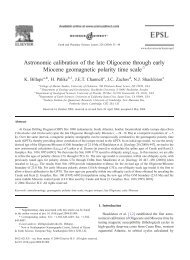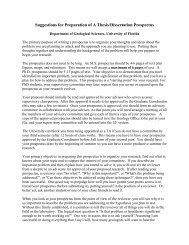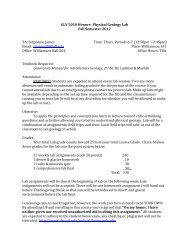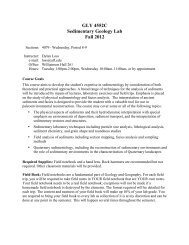GLY1150L: FLORIDA GEOLOGY LABORATORY - Department of ...
GLY1150L: FLORIDA GEOLOGY LABORATORY - Department of ...
GLY1150L: FLORIDA GEOLOGY LABORATORY - Department of ...
Create successful ePaper yourself
Turn your PDF publications into a flip-book with our unique Google optimized e-Paper software.
OCE1001: OceanographyUniversity <strong>of</strong> FloridaFall 2012Course SyllabusCourse website: UF e-Learning (http://lss.at.ufl.edu)Section numbers: 7707Meeting time(s): MWF, period 6 (12:50 – 1:40 p.m.)Location:100 Williamson HallTextbook:Essentials <strong>of</strong> Oceanography (3 rd – 6 th Editions) by Thomas S. Garrison (highlyrecommended).Instructor:Office:Office hours:Email:Shaun Kline343 Williamson HallMonday, 2:00 p.m. – 3:00 p.m., or by appointmentkline.shaun@gmail.comTeaching Assistant: Emily PughOffice:266 Williamson HallOffice hours: Thursday, 1:00 p.m. – 2:00 p.m.Email:emilyrpugh@ufl.eduCourse Goal and DescriptionThis course will provide an overview <strong>of</strong> oceanography. Topics to be covered include marine history,distribution <strong>of</strong> earth’s land and water, nature and relief <strong>of</strong> the sea floor, physical and chemical properties <strong>of</strong> seawater, sea ice, tides, currents, waves, marine sedimentation, ocean life, and beaches and coastal processes.Students should gain a foundation in the geologic, biological, chemical, meteorological, and physicalcomponents <strong>of</strong> the world’s ocean. Regardless <strong>of</strong> major or study area, students should be able understand thebasic concepts and use them to evaluate modern day issues – in both scientific and media realms.GradingGrades will be determined using the following formulation:In-class response scores and take-home exercises: 25%Exam 1: 25%Exam 2: 25%Exam 3 (Final Exam): 25%Final grades may be adjusted, but the minimum numeric grade required for each letter grade is as follows: A(93), A- (90), B+ (87), B (83), B- (80), C+ (77), C (73), C- (70), D+ (67), D (63), and D- (60). For more detailson the meaning <strong>of</strong> letter grades and the University policies related to them, visithttp://www.registrar.ufl.edu/catalog/policies/regulationgrafdes.html.ExamsThree exams will be given throughout the semester:Exam 1: Friday, September 28, 2012 (in class)Exam 2: Friday, November 2, 2012 (in class)Exam 3: Wednesday, December 5, 2012 (in class)
OCE1001 | Course Syllabus 2Anything associated with the class – lecture material, textbook readings and exercises, or other assignments –may be asked on an exam. All exams are cumulative, in that any information is ‘fair game.’ Still, each examwill predominately focus on the most recent material.If needed, exam scores may be adjusted. If the median <strong>of</strong> any exam is below 83 (minimum B), then scores willbe curved to that median score. For more information, please consult the ‘linear’ method athttp://www.ats.amherst.edu/s<strong>of</strong>tware/excel/excel-grading/excel-grades/#CurvingGrades.Make-ups will be provided only when pre-arranged or under extraordinary circumstances.Course ScheduleWeek Date Topic Reading1W 08/22Course IntroductionF 08/24 History <strong>of</strong> Marine Science Chapter 2M 08/27 History <strong>of</strong> Marine Science Appendix III & IV2 W 08/29 Origin <strong>of</strong> the Ocean Chapter 1F 08/31Origin <strong>of</strong> the OceanM 09/03No Class (Labor Day)3 W 09/05 Earth Structure and Plate Tectonics Chapter 3F 09/07 Earth Structure and Plate TectonicsM 09/10 Earth Structure and Plate Tectonics4 W 09/12 Ocean Basins Chapter 4F 09/14Ocean BasinsM 09/17 Ocean Sediments Chapter 55 W 09/19Ocean SedimentsF 09/21 Water Chemistry Chapter 6M 09/24Water Chemistry6 W 09/26 Atmospheric Circulation Chapter 7F 09/28 EXAM 1M 10/01Atmospheric Circulation7 W 10/03Atmospheric CirculationF 10/05 Ocean Circulation (Surface) Chapter 8M 10/08Ocean Circulation (Surface)8 W 10/10Ocean Circulation (Deep)F 10/12 Waves Chapter 9M 10/15Waves9 W 10/17 Tides Chapter 10F 10/19 Coasts & Beaches Chapter 11M 10/22Coasts & Beaches10 W 10/24Coasts & BeachesF 10/26 Climate Change & Sea LevelM 10/29 Climate Change & Sea Level11 W 10/31 Life in the Ocean Chapter 12F 11/02 EXAM 2M 11/05No Class12 W 11/07Life in the OceanF 11/09No Class (Homecoming)M 11/12No Class (Veterans’ Day)13 W 11/14Life in the OceanF 11/16Life in the OceanM 11/19 Pelagic Communities Chapter 1314 W 11/21No Class (Thanksgiving)F 11/23No Class (Thanksgiving)
OCE1001 | Course Syllabus 3Week Date Topic ReadingM 11/26Pelagic Communities15 W 11/28 Benthic Communities Chapter 14F 11/30Benthic CommunitiesM 12/03 TBD Chapter 1516 W 12/05 EXAM 3F 12/07No Class (Reading Day)The above schedule is tentative and subject to change.announcements made on eLearning and in class.You are responsible for keeping up withLecture MaterialsTextbook (highly recommended)At the following Cengage website, a new 3 rd edition textbook is $69.00; an e-book version is $48.00:http://www.ichapters.com/tl1/en/US/storefront/ichapters?cmd=DisplayLandingPage&id=1755&cid=MS1191&entityNumber=4462. However, please feel free to purchase a 3 rd -6 th edition <strong>of</strong> the textbook (paperback or e-bookversion) from any other source (bookstore, Amazon, e-Bay).Response Device (one <strong>of</strong> the following is required)ResponseCard RF: The UF bookstore sells these responders for $33.50 ($55.00 new on Amazon). Be carefulpurchasing used ones - they may not be RF. Students can purchase clickers for $25.00 (+ shipping) directlyfrom TurningPoint at http://store.turningtechnologies.com. Enter the code "4UFL" (without the quotes).Shipping cost varies between approximately $5.00 and $35.00. A spare set <strong>of</strong> batteries is also recommended.They use two CR2032 batteries, which should last 6 months to a year with normal usage. Replacementbatteries are available from Academic Technology Accounting in 1120 Turlington Hall for $0.47 each (twobatteries + sales tax = $1.00). To use the device:1. Register the 6 digit ID# through the eLearning class website. (Once in the class website, select‘Assessments’ in the left panel. Take the quiz entitled ‘TurningPoint Device ID.’ Re-do quiz if your codeshould change.2. At beginning <strong>of</strong> class, press and release the ‘Ch’ or ‘Go’ button. Then, while red/green flashing, enterchannel ‘41’, then ‘Ch’ again.ResponseWare: This allows smart phones (Android, iPhone, Blackberry), tablets, or laptops – anything withweb access – to become a virtual clicker. You can purchase a ResponseWare license ($16.00 for 1 year) fromhttp://store.turningtechnologies.com. Enter the code "4UFL" (without the quotes). After purchasing thelicense:1. Create an account on http://rwpoll.com using the license code just purchased.2. Register the virtual device ID# through the eLearning class website. (Once in the class website, select‘Assessments’ in the left panel. Take the quiz entitled ‘TurningPoint Device ID.’ Re-do quiz if your codeshould change.3. At the beginning <strong>of</strong> each class, join the session using the Session ID provided by the Instructor usingeither the http://rwpoll.com website or the mobile device app.In-class Attendance/Response ScoresAttendance will not be taken formally, but the response system will be used in every lecture beginningSeptember 5, 2012. For questions asked during class, points will be awarded (3 for a correct answer, 2 for anincorrect answer). The in-class responses should motivate you to attend class – both physically and mentally.They will also allow the Instructor to discover which lecture concepts need to be reinforced or taught differently.Non-answers, whether because <strong>of</strong> absence, tardiness, absentmindedness, or non-attentiveness, will receive
OCE1001 | Course Syllabus 4no points – no exceptions. Do not answer for anyone else; any student caught possessing more than oneresponse device will lose 50 points (along with the device owner).To accommodate those with legitimate excuses or technical difficulties, each student will be given an extra 40response points, equivalent to 4 or 5 lectures (there will be approximately 300 total response points). It will notbe possible to exceed 100% for the ‘In-class response scores and tale-home exercises’ portion <strong>of</strong> your grade,but it would be considered in the case <strong>of</strong> ‘borderline’ grades.Take-home ExercisesCertain course topics are best reinforced with take-home exercises. A handful (3-4 exercises, ~20 pointseach) will be assigned throughout the semester. Please adhere to all University academic honesty policies(see below). Exercises will be due approximately one week after they are assigned. Assignments areconsidered late if they are not turned in by the beginning <strong>of</strong> lecture (12:50 p.m.) on their due date; lateassignments will be accepted up to one week after their due date for half credit.Accommodation for Students with DisabilitiesStudents requesting classroom accommodation must first register with the Dean <strong>of</strong> Students Office(http://www.dso.ufl.edu/). The Dean <strong>of</strong> Students Office will provide documentation to the student who mustthen provide this documentation to the Instructor when requesting accommodation.Academic HonestyThe University defines an academic honesty <strong>of</strong>fence as “...the act <strong>of</strong> lying, cheating, or stealing academicinformation with the intent to gain academic advantage.” As a University <strong>of</strong> Florida student, one is expected toneither commit nor assist another in committing an academic honesty violation. Additionally, it is the student’sduty to report observed academic honesty violations. The following actions are examples <strong>of</strong> violations <strong>of</strong> theAcademic Honesty Guidelines: cheating, plagiarism, bribery, misrepresentation, and conspiracy. Other forms<strong>of</strong> academic dishonesty include collusion (unauthorized or undocumented collaboration) and re-submission(presenting an assignment that you have turned in before in another class). For further details on theUniversity’s academic integrity policy, visit http://www.dso.ufl.edu/judicial/procedures/academicguide.php orconsult the Student Conduct Code. If you choose not to follow this policy, you will fail the course.General Conduct NotePlease be respectful <strong>of</strong> fellow classmates and all University employees, as well as all University property, at alltimes. Avoid being a distraction to your peers or the Instructor during lectures. Please adhere to the following:• Turn <strong>of</strong>f or mute cell phones and other electronic devices before class. Put them away during thelecture unless they are being used as in-class responders (please mute them still).• Do not talk with other students during class. If you have a question regarding the lecture, pleaseaddress it to the Instructor.• Do not use a computer for anything other than taking notes or using ResponseWare.• Pay attention during lecture (i.e. no sleeping, reading the newspaper, finishing work for other classes).• Limit late arrivals, early departures, and otherwise leaving your seat to emergencies only.Your conduct can impact the in-class response grade and will be considered in ‘borderline’ grade decisions.







